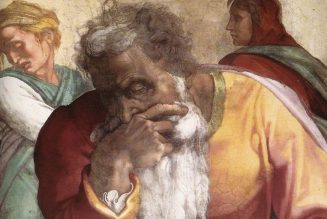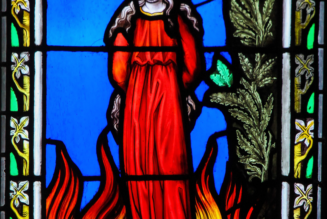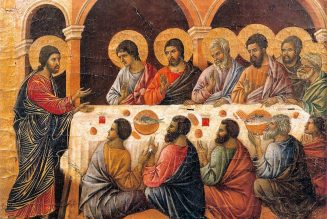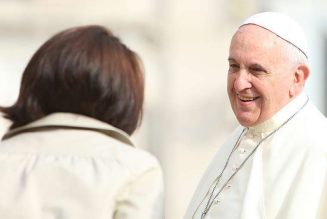By Dr. Jeff Mirus ( bio – articles – email ) | Jul 13, 2023
Anyone who has read and believed the history of the Jews in the Old Testament knows that God abhors false religions. Anyone who has read and believed the words of Christ in the New Testament knows that he who rejects Christ’s messengers rejects Christ, and that Christ has commissioned the Church to preach the Gospel to the whole world. One wonders, then, how the head of World Youth Day in 2023—Lisbon’s Auxiliary Bishop and Cardinal-designate Américo Alves Aguiar—can announce proudly that the purpose of WYD is not to convert young people. Rather, its purpose is to get young people of all faiths and no faith to feel comfortable with each other.
And then, of course, he referred to Pope Francis’ 2020 encyclical on Social Friendship (Fratelli tutti). But what Cardinal-designate Aguiar calls even more to mind is the famous joint statement Pope Francis signed with the Grand Imam of Al-Azhar in 2019, Human Fraternity for World Peace and Living Together, which states: “The pluralism and the diversity of religions, color, sex, race and language are willed by God in His wisdom, through which He created human beings.”
It is difficult to “explain away” incidents and developments like this when assessing the Catholicity and even the competence of the current pontificate, but it is still worth explaining at least some of the principles that are at stake in such distressing developments.
Magisterial Authority
The joint “Human Fraternity” statement signed by the Pope and a Muslim leader, of course, is not an exercise of the Church’s magisterium, and it has no intrinsic doctrinal weight. Nonetheless, one does like to understand statements signed by the Pope in a manner consistent with Divine Revelation, and this can be done by emphasizing two things which were more or less deliberately blurred in the statement, at least partially for diplomatic reasons. First, the context of the statement about the diversity of religion is the desire to emphasize as a basis for legitimate policies that human characteristics which are essentially beyond our personal control ought not to become matters for persecution or compulsion. Thus the text goes on to state that “The pluralism and the diversity of religions, color, sex, race and language are willed by God in His wisdom, through which He created human beings”. The point is that:
This divine wisdom is the source from which the right to freedom of belief and the freedom to be different derives. Therefore, the fact that people are forced to adhere to a certain religion or culture must be rejected, as too the imposition of a cultural way of life that others do not accept.
All of this is extraordinarily fuzzy, of course, as are so many diplomatic texts which serve as first steps toward mutual tolerance and acceptance, and toward the diminishment of any sort of ideological hostility. The main trouble with this statement for everyone in the world is that it tends to militate against the efforts of any human culture to establish basic patterns of life conducive to the common good. It fails to state specifically exactly which cultural (and governmental) efforts must be prohibited and which may be allowed. It is dependent more on a mutual agreement about the status quo than on a serious theory of the common good. While it is clear that it has in mind enforcements that impact religion, color, sex, race and language, we have seen cultural, political and economic pressures get completely out of control in recent decades in many areas of life, especially in matters of disordered sexual desire—and not in the ways originally envisioned for improving the position of women or Christians in the Muslim world!
God’s Active Will
But the main trouble for Catholics is that this statement mixes up elements of our nature (such as “color”, “sex”, and “race”), which are received without the involvement of our will or our consent, and over which we have no control, with religion, which is a matter of commitment of mind and will (even if sometimes under compulsion). Language, which is also cited, is of course culturally-transmitted and largely irrelevant to this discussion, except insofar as some would wish to suppress a language out of hostility to those who speak it. The main, trouble, in other words, is that commitment to a religion is a personal decision (though again not always completely free or even fully embraced) to accept a belief system that can be true or false, or even good or evil.
It is just here that we need to make an important distinction about the will of God which, precisely by being left out of the document, undermined its truthfulness. For when we say God “wills” something, we can mean that He wills it in the sense of permitting it as part of his Providential plan (as is the case with every evil), or we can mean that He wills it in the sense of actively presenting it as a good which we are to accept and embrace. It is beyond question, if not from common sense then from Divine Revelation, that the multiplicity of religions is in fact not actively willed by God, but merely permitted. This is extraordinarily clear in both the Old Testament and the New, in both the Jewish religion and the Christian—which, by the way, are the only two religions which even claim to be publicly and demonstrably revealed by God.
This point is valid from the human point of view generally. It is absurd to posit (taking the case of Islam as the context of the joint statement) that God desires people to embrace a religion made up by a warrior prophet who claimed, with no evidence other than military victory, to represent a new revelation bestowed by God on the world. It is equally absurd to argue that God desires the acceptance of the views of any other false preachers of any type or sect who claim to represent some personal revelation, some ancestral practice, some purely human taradiddle, or some diabolical imposition which goes beyond the common sensical awareness of and reverence for a Supreme Being which we possess through our own nature. An authentic Revelation from God must be attested by signs that only God can produce. Moreover, beyond the recognition of and reverence for God that is apparently embedded in our human nature, it is only this Divinely-attested sort of revealed religion that God actively wills us to accept.
Social Fraternity
As I noted at the outset, Pope Francis’ encyclical Fratelli Tutti also provides a background for this discussion. That encyclical is essentially a reflection on the figure in the Gospel we know as the “Good Samaritan”, and while it (deliberately) has few distinctively Christian elements, it serves as a reminder that we are called both implicitly in our human nature and explicitly by Divine Revelation to love all of our “neighbors” and be generous in service to them. The problem here is our tendency to define generous service in purely cultural terms. How much evil is done today under the name of human rights and human service! It is very easy for both our Catholic leaders—and certainly our culture as a whole—to forget that the greatest service we can provide for all our neighbors is our witness to the wholeness of Christ, as exemplified not only by the avoidance of personal hostility, cheating, exploitation and other forms of ill-treatment in all of our relationships, and indeed by the corporal works of mercy, but also by the spiritual works.
One of the difficulties we face today (and, really, in every era) is that we tend to reduce Christianity to whichever of its elements are most fully reflected in our dominant culture. Nobody who is anybody would argue that we are to be anything but “kind” to anyone, as long as the nature of “kindness” is completely culturally-determined, in accord with what “everybody who is anybody” thinks. Therefore, there is always a grave danger of allowing our “embrace” of others to be determined by our own warped notions of “the good”, instead of being opened to the full range of God’s goodness. To put this fully into the Christian context, let me repeat just one of Our Lord’s questions, in context:
If any man would come after me, let him deny himself and take up his cross and follow me. For whoever would save his life will lose it; and whoever loses his life for my sake and the gospel’s will save it. For what does it profit a man, to gain the whole world and forfeit his life? For what can a man give in return for his life? For whoever is ashamed of me and of my words in this adulterous and sinful generation, of him will the Son of man also be ashamed, when he comes in the glory of his Father with the holy angels. [Mk 8:34-38]
Christ always subordinated everything to the goal of being one with Him in the Father’s love. This cannot be accomplished through a purely humanitarian interpretation of the Gospel. Either we are willing to lose our life—our earthly attachments, our personal theories of existence, our desire for worldly peace and security, our enchanting habits and socially comfortable attitudes—in order to receive the life Christ offers…or else we are simply preaching a very different gospel, a gospel which serves our own prejudices and our own comfort in this world.
Endless confusion
Sadly, we cannot expect even Churchmen and “Catholic educators” to think with philosophical and theological clarity—or even with common sense. The pressure of fashion is apparently far too strong. It is very troubling that the head of the 2023 World Youth Day should willfully abandon that event’s founding purpose to challenge youth to a deeper Catholic commitment by gathering them together in an experience of joyous life in Christ. It should be the fervent hope of the Church that each person who attends World Youth Day will either deepen his or her commitment to Christ in the sacramental and doctrinal life of the Church He founded, or at least find a fully Catholic embrace of Christ both intriguing and attractive.
Pope Francis, in speaking so much about the dangers of Christian proselytism (which I doubt has been a problem anywhere in the Catholic world for many generations), has either caused Catholics to fear that they ought not to bear clear witness to the actual message and teachings of Christ, or given them the excuse not to do what they should have all along felt called to do. That this attitude should surface so clearly in the cardinal-designate who is in charge of World Youth Day this year would be beyond the bounds of belief—no matter what he may have “meant”—if the groundwork for such attitudes had not been so carefully laid over the past ten years.
Fraternity is inadequate and ultimately empty until we find it through adoption as sons and daughters of God in Jesus Christ. This is why St. Paul wrote to the Corinthians that “I resolved to know nothing when I was with you except Jesus Christ and Him crucified” (1 Cor 2:2). It is also the whole point of Christ’s discourse on the bread of life. In fact, the question cardinal-designate Aguiar must answer has already been asked very pointedly by our Savior: “What father, when his child hungers for bread, will give him a stone?”
Sound Off! CatholicCulture.org supporters weigh in.
All comments are moderated. To lighten our editing burden, only current donors are allowed to Sound Off. If you are a current donor, log in to see the comment form; otherwise please support our work, and Sound Off!










